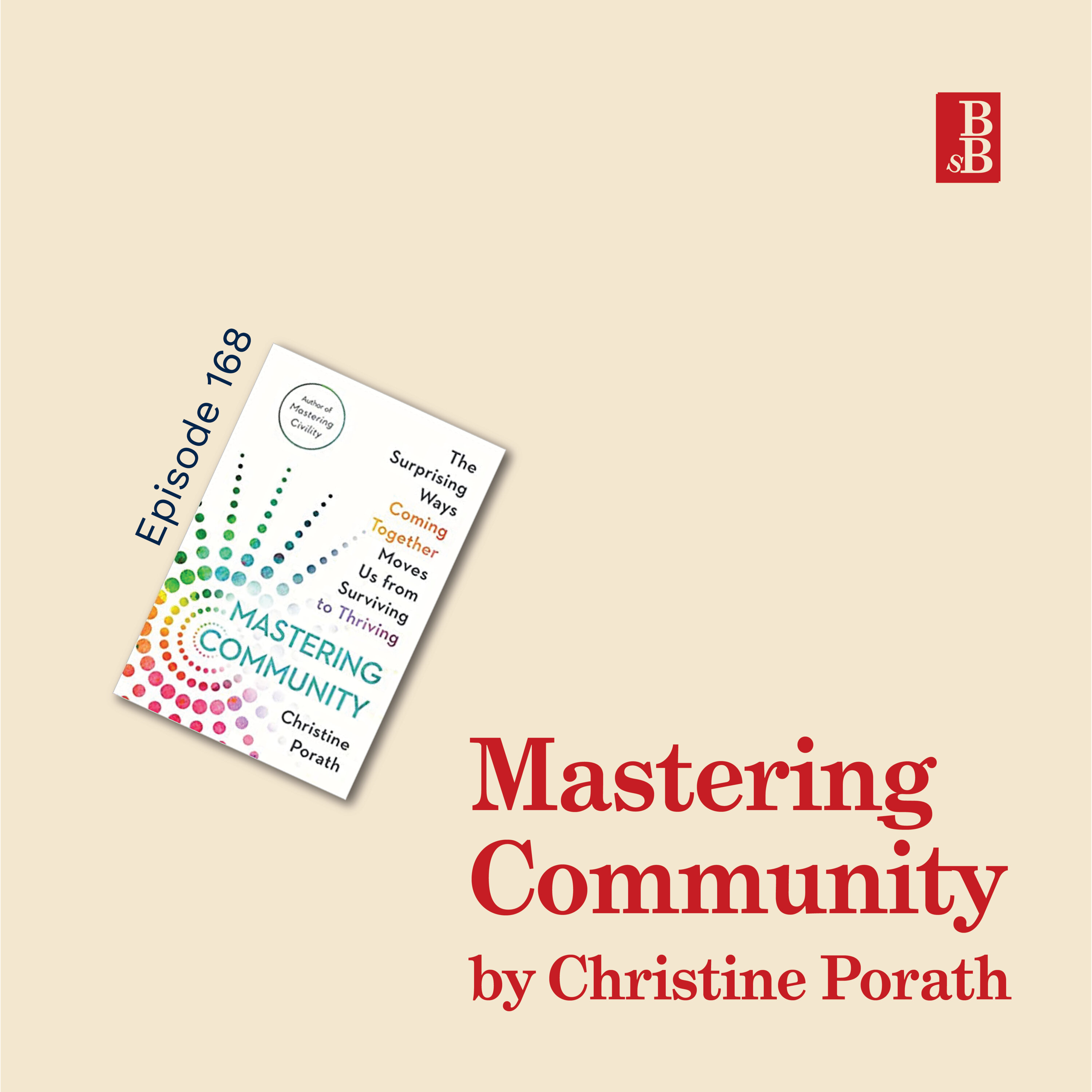Mastering Community by Christine Porath: why you need to let people go to keep them together

\xa0
\nAbout the\xa0book
\nDespite our deep desire to feel a sense of belonging, many of us feel isolated. The rise of technology and modern workplace practices have led people to be even more disconnected, even as we remain constantly contactable. And as our human interactions have decreased, so too have our happiness levels. This is sparking a crisis in mental health that will have repercussions for years, leaving people lonelier and organizations less productive and profitable, too. What Christine Porath has discovered in her research is that leaders, organizations, and managers of all stripes may recognize there is a cost but have few solutions for how to implement the cure: Community.
\nSource: http://www.christineporath.com/books/
\nAbout the\xa0author
\nChristine Porath is a tenured professor at Georgetown University\u2019s McDonough School of Business. She\u2019s the author of Mastering Civility: A Manifesto for the Workplace and co-author of The Cost of Bad Behavior. Christine is a frequent contributor to the Harvard Business Review, and has written articles for New York Times, Wall Street Journal, McKinsey Quarterly, and Washington Post. She frequently delivers talks and has taught in various Executive programs at Harvard, Georgetown, and USC. Prior to her position at Georgetown, she was a faculty member at University of Southern California\u2019s Marshall School of Business.
\nChristine\u2019s work has been featured worldwide in over 1500 television, radio and print outlets. It has appeared on 20/20, Today, FoxNews, CNN, BBC, NBC, msnbc, CBS, ABC, and NPR. It has also been included in Time, the Wall Street Journal, the Financial Times, Fortune, Forbes, NY Times, The Washington Post, and L.A. Times.
\nSource: http://www.christineporath.com/
\nBig idea #1\u200a\u2014\u200aBring them together and let them\xa0go
\nThe first rule of community is bringing people together, which is probably comes as no surprise. Connecting and uniting people is the core of a community, that can be people on the same team, such as the Chicago Bulls, or disparate people who share a common ailment, as in the practice of shared medical appointments used in some medical institutes in the US.
\nUnity has an exponential effect if it\u2019s done well, by positively impacting one person the whole community gets better. However, to truely realise the potential of a community you have to let go of them, let go of yourself, and let go of your ego.
\nThe founders of the 100,000 Homes Campaign found this when they discovered that a community group was using their manual, but they hadn\u2019t been through the 100,000 Homes official training. This group had got hold of the manual through another group who had been through the training.
\nNow at first the 100,000 Homes team were a bit affronted, they thought that if these people hadn\u2019t been trained properly how could they have do the work? It\u2019s easy to let ego get in the way, but you can\u2019t get the scale and the impact if you stay too centralised and controlled. For a campaign like this, trying to get 100,000 people experiencing homelessness into homes and into stable living arrangements, they quickly realised that they were not going to do that on their own. What they instead decided to do was help empower other groups and set the principles and practices.
\nWhat you need to do is have clear guidelines and guardrails on what matters, what you can do, what you can\u2019t do, and let people get on with it. Southwest Airlines do a really good job of this, they let their people make the best decisions for their customers by making it incredibly clear what\u2019s important. As a result you get amazing stories of the lengths that Southwest staff will go to for their customers.
\nBig idea #2\u200a\u2014\u200aR.E.S.P.E.C.T.
\nRespect is at the core of any community you\u2019re building. Without it, you won\u2019t have a healthy community. Christine takes this idea further with the behaviour of civility, which is to move culture forward in a more civil way. Civility happens throughout the life cycle; as you hire reward, promote, and train for civility. She says that civility boosts, trust, likeability, and perceived integrity.
\nSome situations get to the stage where you just have to start again. There was an example of this in the book of a company called Traeger, led by Jeremy Andrus. When he joined Traeger the culture was toxic, at one point it became physically dangerous, this was the catalyst that something drastic had to change. After a number of months of trying to make some changes and coming up and getting more and more resistance because of what had come before, Jeremy decided to shut down the headquarters and move it to another state. This meant they let a lot of people go, but it also meant they could bring the right new people in to lead the company going forward.
\nThere was obviously a huge financial, emotional, and operational cost involved in doing that, but the results that the company achieved in the time that Jeremy was was CEO as a result of those changes were phenomenal.
\nBig idea #3\u200a\u2014\u200aYour\xa0role
\nAs the world feels bigger and more complex, it\u2019s easy to dismiss our own roles in community and culture, because it feels so much bigger than just us.\xa0
\nBut Christine says there\u2019s four things you can influence that will help you better contribute to a community.\xa0
\n- \n
- Self-awareness: asking for some hard feedback, or getting some coaching that sheds light on some of your blindspots. \n
- Physical wellbeing: just moving our bodies and the getting all the physical and mental benefits of doing so will help you better contribute to your community. \n
- Recovery: making sure you\u2019re sleeping, getting enough rest, taking time off, and seeing this as an important part of your work. \n
- Mindset: adopting a growth or a positive mindset to overcome challenges, and also helping others do the same. \n
\xa0
Support my book habit: https://www.buymeacoffee.com/stephsbookshelf
See omnystudio.com/listener for privacy information.